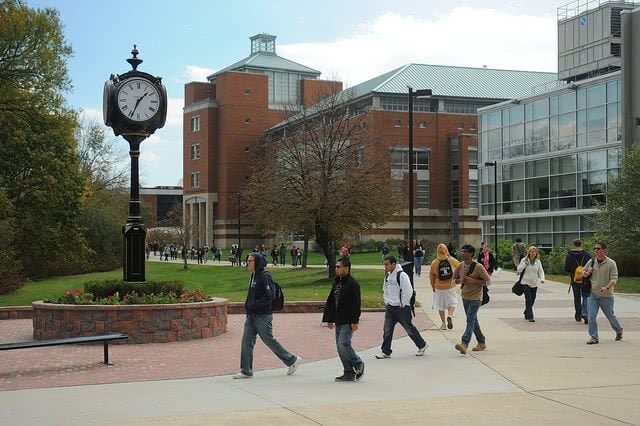
Flickr user Rowan University Publications
Whether you’ve already chosen your dream school or you’re still looking for a college that’s the perfect fit for you, there are some things you must check out during your next college visit. Here are some things you should put on your college visit checklist.
1. Classrooms
One thing that definitely belongs on your college visit checklist is classrooms. What are the classrooms like? Are they comfortable? Can you see, hear, and function within the classroom in a way that makes you comfortable? What are they like in the winter, when it’s cold? What are they like in the heat of summer? What’s the lighting like?
Are there enough electrical outlets to facilitate an entire lecture-hall full of laptops and tablets, should it be necessary for an entire class to plug in?
Look around. When in doubt, ask. Campus tour guides are well-versed in answering questions of this nature, and they won’t mind answering questions like this. It’s also a good idea to sit in on a real class during your visit, to see what the experience is like.
2. Gym / Rec Center
Visit the school’s gym or student recreational center and see if they have a good space, or extra health amenities, such as tennis courts, swimming pools, a track, or weight rooms. Check what the hours are, and find out if there are specific requirements to use the facilities.
3. Dorms
On some campuses, living in dorms as a freshman is an option, while on others it is mandatory to help ease freshmen into the college experience. If you are going to be living in the dormitory, you should find out what the facilities are like. Check out the main residential living quarters. Ask about what is and isn’t acceptable to have in your dorm room, such as thumbtacks/nails, microwaves, hotplates, and other possible deal-breakers.
4. Library
It’s always a good idea to check out the library. You may opt to take the freshman-scheduled tour, which is fine, but if you are visiting the campus by yourself or with friends, ask to peruse the stacks. Do they have good reference materials? A computer lab? Study spaces? What are the library hours during mid-terms and finals? Some campuses opt to allow students to use the library twenty-four hours during mid-terms and finals, while others simply extend the hours if possible. Either way, find out.
5. Student Resource Centers
What resources are available to you as a student? What are the care facilities like in case you get sick or hurt? What if you feel you may need counseling? Many campuses have student resource centers right on the campus itself so you don’t have to venture far to get the care you need. Bigger campuses have larger centers. Ask and look around. You want to know if the resources you need most are easily available.
6. Cafeteria
No, seriously, what’s the food like? On some rural and remote campuses, the cafeteria may be your only option, unless you intend to drive to any nearby towns or cities. Does the campus offer a cafeteria food plan? If so, ask about it and see which food options may be more cost-effective. Sometimes a food plan may cover your student rec center food court as well. Just because someone brags about living off delivery pizza doesn’t mean this is a good idea, and it certainly may not be your best option. That’s why the cafeteria also belongs on your college visit checklist.
7. Off-Campus Housing
What is rent like off-campus? Is anyone interested in renting a house? What are the utilities like for off-campus housing? For some students, only a new apartment complex will do, while others may find quaint, homey charm in renting spaces that are more like a house than a housing development. Sometimes it really is cheaper to rent an apartment with friends than live on-campus in a dorm. Ask around and see what is available and how much it will cost you.
8. Greek Life and Other Organizations
Not everyone is interested in Greek life (fraternities and sororities), but for those who still want to join an organization, there are plenty of resources and clubs available. You just need to ask. Remember, though you really are there to learn, and any fun or civic activities should be secondary to your academics. This is especially true when pledging or joining a fraternal organization. Many Greek organizations have strict guidelines pertaining to member GPA, so make sure you really can handle this type of responsibility before pledging and signing on.
9. Nearby Towns or Cities
Just because you are in school, you won’t be studying all the time. It’s always a nice idea to see what the surrounding area is like. Those who plan on moving far from home should look at what kind of communities are nearby, whether rural, suburban, or a larger city. When you graduate, you may decide you like life near campus so much, you want to move there. This is especially true for your first job out of school, and sometimes you find your second home isn’t that far from campus after all. Weekend trips into nearby towns and cities can make things more bearable when there are things to see and do when you’re far from home. Have a look and see what you think.
Use College Raptor to discover personalized college matches, cost estimates, acceptance odds, and potential financial aid for schools around the US—for FREE!


